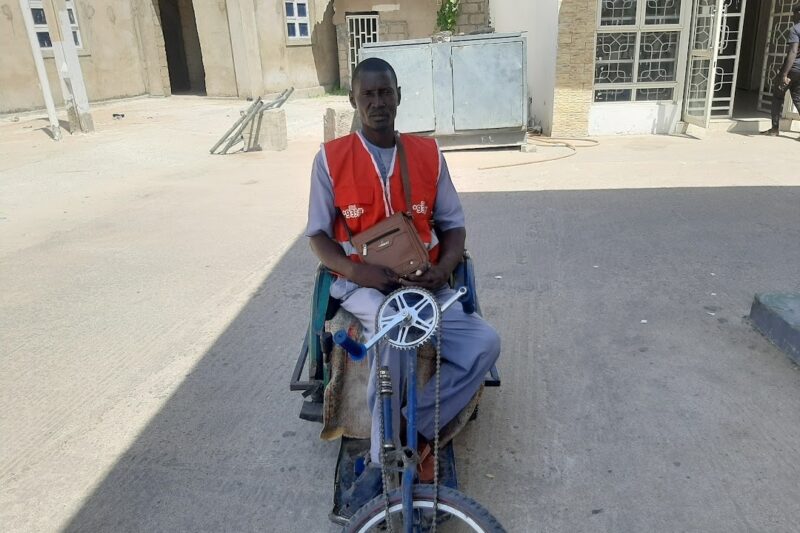Borno State government announces there will be no more begging, loitering or gallivanting on Maiduguri streets from now on.
If the new law forbidding all people – but particularly those with physical disabilities – continues, “hunger will kill many of us”.
This was the reaction of Mai Ali, the president of the Borno State Association of the Blind, when he heard that all begging on the streets had been banned with immediate effect in the Maiduguri Metropolis and its environs, including the Jere Local Government Area.
Usman Tar, the state’s commissioner for information and strategy, made the announcement in a statement released on Sunday, October 22. Loitering and gallivanting were included in the ban.
“Whoever violates the ban will be prosecuted,” he said in the statement.
“In Borno State, street begging and aimless loitering are not in our character. We are dignified people. This is to inform members of the public that, with immediate effect, the Borno State government has placed a strict ban on all street begging, loitering and gallivanting within and around the Maiduguri Metropolis and the Jere Local Government Area,” he said.
“The ban applies to the following areas: All public buildings, all places of worship, all commercial premises, the Musa Usman Secretariat, Monday Market, Old Maiduguri Market, Budum Market, Lagos Street, Custom Area, Post Office area, Galadima Junction, Police Commissioner Junction, Damboa Road, Baga Road and Dandal Way.”
Modu Aisami Zonal, coordinator for the Borno State chapter of the Joint National Association of Persons with Disabilities and secretary of the Borno Emirate Blind, told RNI the government had not contacted the association before taking this decision.
“The first time I heard of this was today when you told me,” he said to RNI’s reporter. “I’m just hearing it from you.”
He said that in 2019 street begging was banned in certain locations in Maiduguri.
“Before imposing the ban, the association held several discussions with government officials and we came to an agreement.
“But this time around not one single word was said to us. The government went ahead without letting us know. My concern is that our disabled and blind people, who depend on what they get by begging every day, are probably not even aware of the ban and they could be caught and be punished by the government.
“We are a renowned association and all disabled people rely on us to tell them if there are changes in the law. It is paramount that every action taken by the government that concerns us should be discussed with us. We need to be informed so that we can inform our people. The need to follow a proper channel to communicate an issue that can affect thousands of people is essential. Most of the disabled people have gone out today. I hope they won’t be arrested or assaulted by security personnel.
“It’s not that I’m against what the government has imposed, it’s a matter of concern that needs to be addressed because of the huge number of people begging on the streets. Most are not physically challenged or disabled. But because of hunger and poverty they go out to beg so that they can feed their families.”
Zonal said that from 2019 until June this year the government gave disabled beggars a stipend of ₦15,000 each month. This was meant to stop them from roaming the streets. Since June, the beggars had not received anything from the government.
“But people have families to feed. How are we supposed to survive if the government bans us from begging? If the government seriously wants us to stop begging, it needs to support us so that we can live independently.”
Mai Ali told RNI that the government went ahead and imposed the ban without telling anyone.
“No one said a word. We just woke up on Monday to hear the sad news that we cannot beg in the streets. We urge the government to investigate our situation. If we cannot beg, the least it could do is to reinstate the ₦15,000 monthly stipends. This would help to some degree. What are our people supposed to do now? Without financial support a lot of people will suffer. My fear is that hunger will kill many of us.”
Abdulrahman Mohammed, a disabled man, said: “The government needs to help disabled people find a reliable means to live independently. Without government aid disabled beggars will not be able to feed their families. They will not cope. They should be given money to start their own business.”
“Considering the ever-increasing number of beggars who rely solely on begging, this ban is extremely worrisome. Somehow the government has to find a way to control the escalating numbers. With help, there are ways and means. I am physically disabled but I don’t beg. I sell airtime and phone recharge cards. I’m happy with the life I am living.”
Adam Mohammed Buza, who runs a business on at the Police Commissioner Junction – known for its many beggars – said he was relieved to hear about the ban.
“I’m so happy that the government has acted on this matter. Every day the number of street beggars increases, not only here but at other junctions too. There are mothers with their children, old men and women of all ages begging on the street. Begging is not part of our culture in Borno State. I have not seen any beggars today. If any appear the police are patrolling and they will send them away.”
FALMATA MOHAMMED ALI






